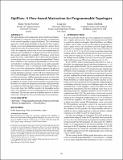OptFlow: A Flow-based Abstraction for Programmable Topologies
Author(s)
Ghobadi, Manya
Download3373360.3380840.pdf (7.829Mb)
Publisher Policy
Publisher Policy
Article is made available in accordance with the publisher's policy and may be subject to US copyright law. Please refer to the publisher's site for terms of use.
Terms of use
Metadata
Show full item recordAbstract
The rapid adoption of Reconfigurable Optical Add-Drop Multiplexers (ROADMs) is setting the stage for the dynamic reconfiguration of the network topology in optical backbones. The conventional approach to enable programmability in the physical layer requires solving a cross-layer optimization formulation that captures the interplay between the IP and optical layers. However, as the network scales, the complexity and run time of cross-layer optimization formulations grow prohibitively, resulting in heuristic-based solutions that sacrifice optimality for scalability. We propose a flow-based graph abstraction, called OptFlow, that is able to find the optimal allocation faster than a cross-layer optimization formulation. The key idea in OptFlow is that topology programmability is abstracted by "network flows," enabling service providers to use multi-commodity flow formulations, such as conventional Traffic Engineering, to solve a cross-layer optimization. OptFlow augments the physical graph and uses it as input to the unmodified flow-based Traffic Engineering algorithm, capturing a variety of IP-layer optimization goals such as max throughput, min hop count, and max-min fairness. Due to its flow-based nature, OptFlowinherently provides an abstraction for consistent network updates. To benchmark our key assumptions in OptFlow, we build a small testbed prototype consisting of four ROADMs. To evaluate the optimality and run time of large networks, we simulate fiveWAN topologies with up to 100 nodes and 390 links. Our results show that OptFlow matches the throughput performance of an optimal cross-layer formulation but has faster computation times. The run time speed-up of OptFlow increases as the network scales, with up to 8× faster execution times in our simulations.
Date issued
2020-03Department
Massachusetts Institute of Technology. Computer Science and Artificial Intelligence LaboratoryJournal
SOSR 2020 - Proceedings of the 2020 Symposium on SDN Research
Publisher
ACM
Citation
Foerster, Klaus-Tycho et al. “OptFlow: A Flow-based Abstraction for Programmable Topologies.” Paper in the Proceedings of the SOSR 2020 - Proceedings of the 2020 Symposium on SDN Research, San Jose, CA, March 3, 2020, ACM: 96–102 © 2020 The Author(s)
Version: Final published version
ISBN
9781450371018